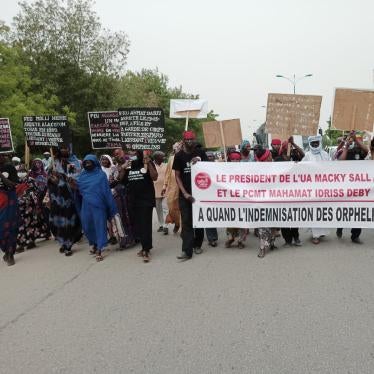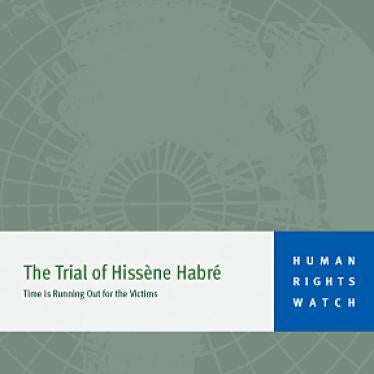(New York)- Government and rebel forces fighting in the Chadian capital N’Djaména must not place civilians at risk, Human Rights Watch said today. Humanitarian agencies have reported substantial numbers of civilian casualties in the past three days of street fighting.
Last last week, Chadian rebels launched a major military offensive that reached N’Djaména, home to around 700,000 people, by the weekend. Chadian government security forces countered with tanks and attack helicopters, and on Sunday night the rebels announced a “tactical” withdrawal from the city. Thousands of Chadians have since poured across the border into Cameroon, with hundreds of thousands more remaining in the capital.
“The government and the rebels have an obligation not to place civilians at risk during military operations,” said Georgette Gagnon, acting Africa director at Human Rights Watch. “Most of the casualties reported in N’Djaména since the fighting began on Saturday have been civilians with bullet wounds.”
Human Rights Watch called on the Chadian government to ensure that it clearly distinguish between civilians and military targets in any helicopter and tank attacks on rebel strongholds. The government must not launch indiscriminate attacks or attacks that would cause civilian harm disproportionate to the military gain.
The laws of war oblige all parties to a conflict to give effective advance warning of attacks that affect the civilian population. Warring parties must take all feasible precautions to minimize harm to civilians, and they must protect civilians under their control against the effects of attacks. They must allow and facilitate humanitarian aid for civilians in need.
Human Rights Watch has received reports implicating Chadian government security forces in the arrests of opposition politicians in the past three days. Among the prominent members of the political opposition reportedly arrested are Ngarlegy Yorongar le Moiban, Mahamat Saleh Ibni Oumar and Lol Mahamat Choua. It is not clear what justification if any exists for such arrests, and Human Rights Watch believes that they may be arbitrary arrests motivated by political reasons.
“We are concerned that the Chadian government is using the fighting as a pretext for settling scores with the unarmed opposition,” said Gagnon.
In the aftermath of a rebel offensive that brought fighting to the streets of N’Djaména in April 2006, a Human Rights Watch research mission documented abuses by Chadian government security forces, including arbitrary arrest, torture and summary executions of civilians suspected of rebel affiliations and their family members. At least 291 civilians and combatants were killed in six hours of fighting during the April 2006 coup attempt.
The Chadian rebels involved in fighting in N’Djaména over the weekend are from the Unified Military Command, an umbrella group that includes the Union of Forces for Democracy (UFDD), the Rally of Forces for Change (RFC) and UFDD-Fundamental. The UFDD is led by Mahamat Nouri, who, before serving in Idriss Déby’s government, was the right-hand man of former Chadian president Hissène Habré, currently in Senegal facing charges of crimes against humanity. Other members of the UFDD also reportedly have ties to Habré
In the event of a rebel takeover in Chad, Human Rights Watch would be extremely concerned about the fate of Chadian human rights activists whose work helped lead to Habré’s indictment.
Human Rights Watch called on France and other countries that maintain embassies in N’Djaména to take steps to extend protection to those human rights defenders and members of the political opposition at risk of arbitrary arrest or physical abuse.
Chadian rebel groups have received support from the Sudanese government, including safe harbor in Darfur.
In recent weeks, growing insecurity has made it difficult for humanitarian agencies to deliver assistance to more than 400,000 refugees and displaced persons living in camps in eastern Chad. In late January, the United Nations High Commissioner for Refugees (UNHCR) began to evacuate national and international staff members in response to escalating violence in the country.
On February 4, the UN Security Council strongly condemned the rebel attacks and welcomed an African Union initiative to mandate Libyan leader Col. Mu`ammar al-Qadhafi and President Denis Sassou Nguesso of the Republic of Congo to put an end to the fighting. The council also expressed its concern for the safety of civilians, including refugees, displaced persons and humanitarian personnel deployed in Chad, reminding all parties that they have a responsibility to ensure their protection.







